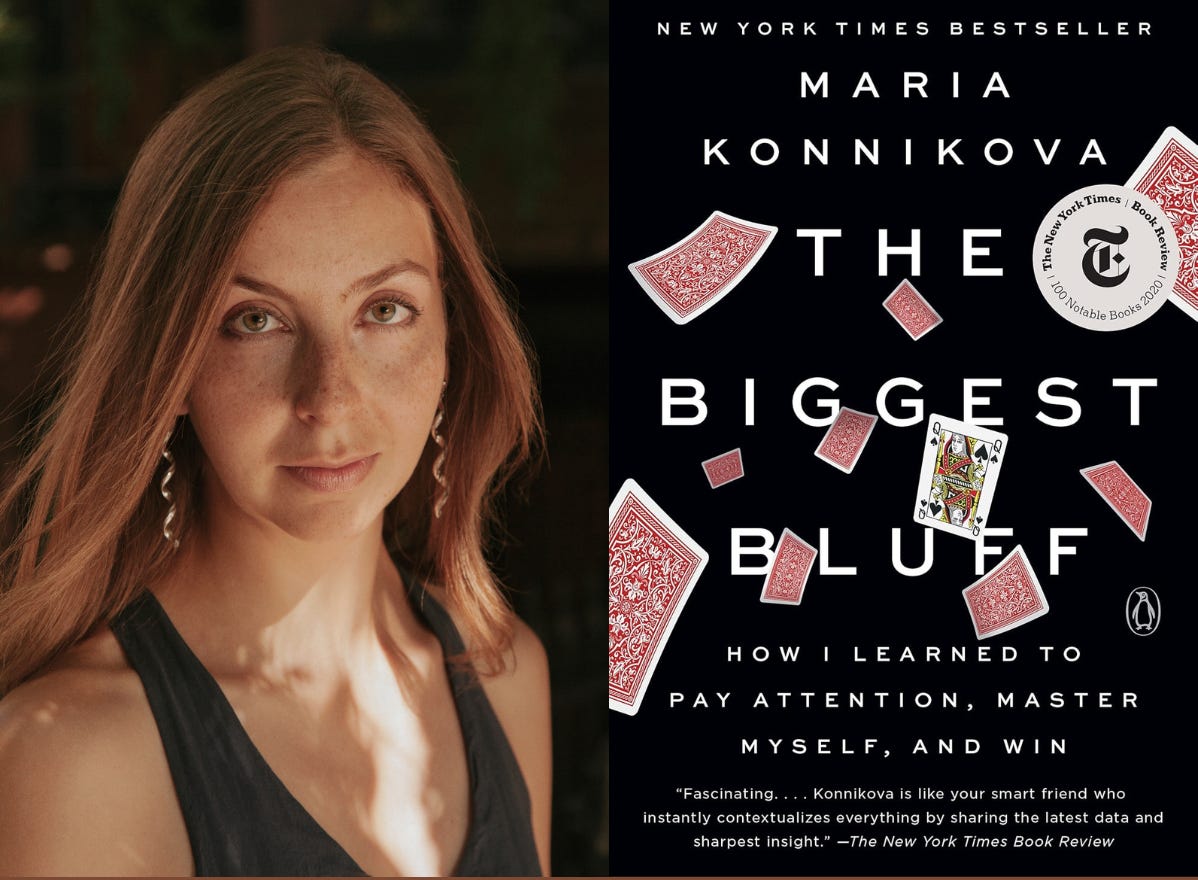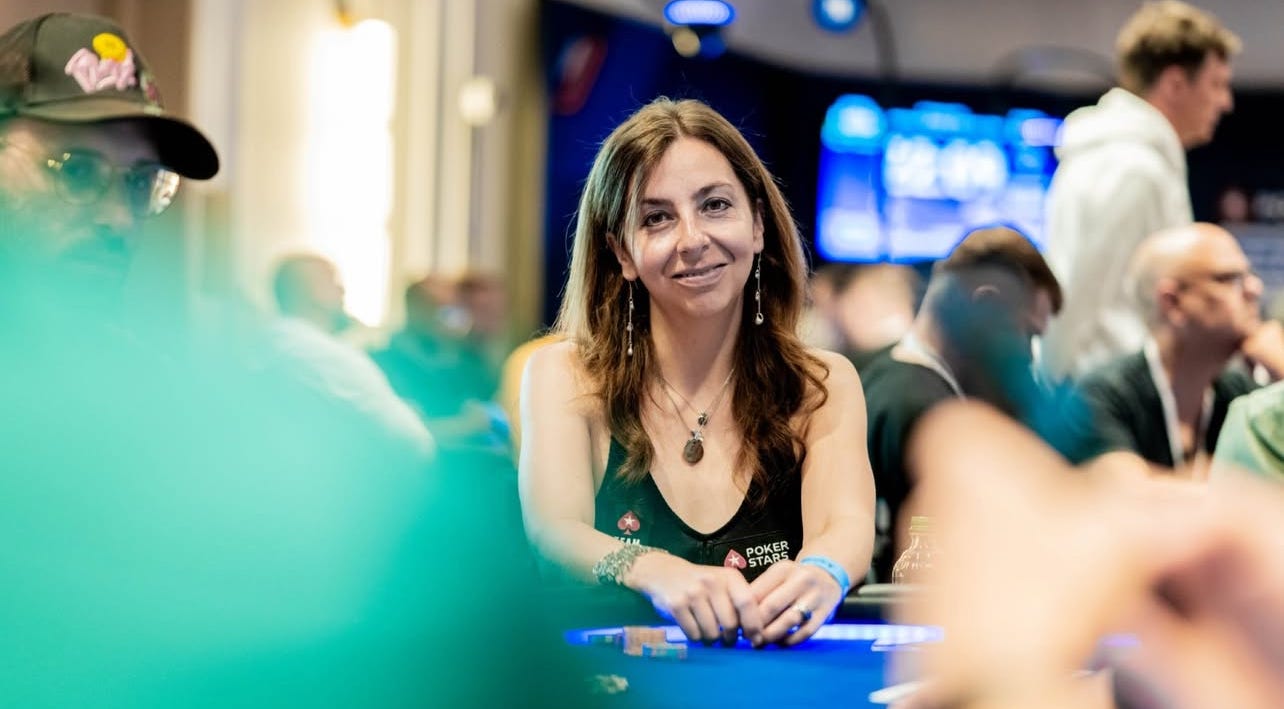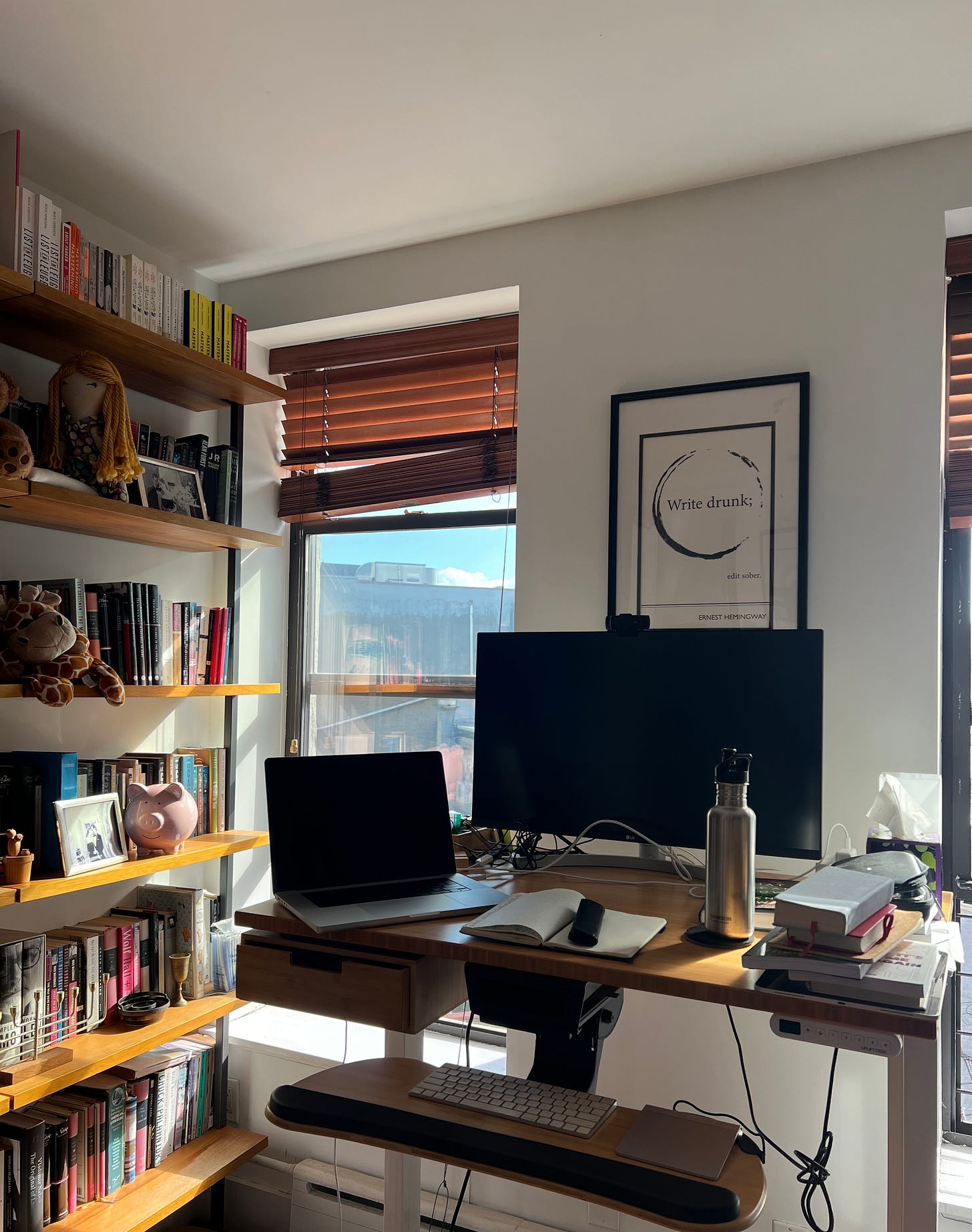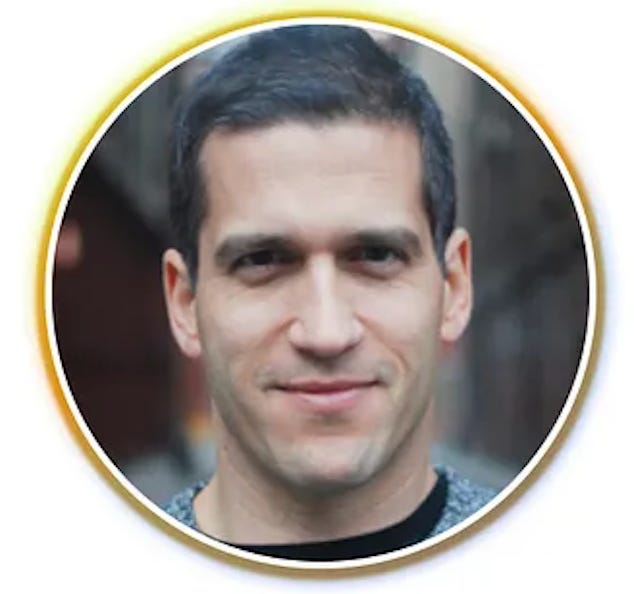The Psychology of the Bluff
Maria Konnikova on writing, risk, and the fine line between skill and luck.
Maria Konnikova has built a career on asking how much of life comes down to chance, and how much is in our control. A New York Times bestselling author, psychologist, and contributing writer for The New Yorker, she’s known for blending deep research with irresistible storytelling. In The Biggest Bluff, she took her curiosity to the poker table, transforming herself from novice to international champion to explore the balance of skill and luck in decision-making.
Her curiosity has since spilled across media. She co-hosts Risky Business, a weekly podcast with Nate Silver, about the science of chance, and writes The Leap, a Substack newsletter that explores risk, intuition, and the creative process. Her next book tackles cheating in games—a topic that, in true Konnikova fashion, doubles as a mirror for human nature itself.
In this Author Insider Questionnaire, Maria talks about curiosity as a compass, writing by hand, and why the only real edge in any creative pursuit is learning to play your own game.
25 Questions with Maria Konnikova
1. I couldn’t have written my last book without…
The endless patience of my editor, Scott Moyers. He gave me a multi-year extension to finish The Biggest Bluff, basically trusting me to do what needed to be done without breathing down my neck. That is truly rare. And now, he is being a saint with my next book. And I will do my best not to disappoint.
2. What’s the thing most people get wrong about being a writer?
That just because you’re doing what you love, it’s always easy going. I have moments where I want to throw my notebook/computer/whatever I’m using at the wall. It can be an isolating and scary existence. I haven’t had a W-2 since 2008. People don’t realize that, yes, you do what you love, but it’s hard work—and it typically doesn’t come with benefits, health care, or a steady paycheck.
3. Hemingway wrote standing up; Edith Wharton, lying down. What are your quirks?
I use a sit-stand desk, but mostly work standing up. I also write all of my first drafts by hand. Yes, even my books. I know enough psychology to understand how much of an edge that gives me. The connection between pen and brain is something that keyboard and brain can literally never replace. (And no, I’m not a Luddite.)
4. Do you read your reviews?
Sure, why not? If a negative review actually engages with my book, I can learn from it. If it’s specious and ad hominem (I’ve had those, too), then it’s good info to never trust that book reviewer’s views on other authors. I never look at YouTube or other video comments, but that’s a different beast.
5. What income streams make up your writing business?
It’s a constant dance. Books; print journalism; speaking engagements; my Substack, The Leap; my twice-weekly podcast with Nate Silver, Risky Business; screenwriting; poker… you name it, I do it. The poker bit is probably the one element that sets me apart from most professional writers.
6. Kiss, marry, kill: podcasts, newsletters, and speaking gigs.
I think I need to marry all three, as they all are important parts of my income!
7. How has AI changed your writing process?
Here’s the thing: I’ve never had a writing assistant. The simple reason is that everyone’s mind works differently, and no one else will go through information the same way that I do. I may pull a fact, a quote, a thread that others ignore just because I realize it could be gold. Even if I employ the most brilliant person in the world, they aren’t me. Sure, they may see different things—but they will miss things that I see. And I will need to go over every piece of work they did, just to make sure. The question is about AI, not actual humans. But if I wouldn’t delegate to the single smartest human assistant, why would I trust an AI? I do use AI and have tried all of them, but when it comes to my writing, it’s all me. Also: I love the research process, the integration, the serendipitous discovery. I never want to give that up.
8. Where do you find new ideas?
Living. Interacting. Being out in the world. Ideas are everywhere. My writing comes from my own curiosity and experiences – which is why I’m such a big believer in unplugging and living your actual life. You never know what you will discover.
9. How do you keep track of new ideas?
In a massive Word document. And notes on my phone. And drafts in my inbox. Very sophisticated.
10. What’s the best piece of professional advice you’ve ever received?
Follow your own curiosity, even if there doesn’t seem to be a point or use to it. Don’t let anyone else tell you what’s “hot” or a good idea. If you don’t connect with it, it will be shit. Not the idea—the idea may be great—but the end product. Not every good idea is a good idea for you, personally, to tackle.
11. And the worst?
Focus on a niche specialization, something that you’re known for. Don’t write fiction if you’re known for non-fiction. Don’t write about literature if you’re known for science. What nonsense. But I’ve gotten that advice many times.
12. What is the one piece of advice you would give to recent graduates who want to make a living as writers?
Make sure you absolutely love this thing we do—and that you can’t not do it. Writing has always been a touch-and-go industry, and with the rise of AI, it’s even more so. You won’t have a steady paycheck. You often won’t have health insurance. And it won’t get easier. So if you aren’t passionate about it and intrinsically motivated by the process itself, maybe do something else.
13. Whose career do you most admire and why?
Nora Ephron. I don’t think that needs much of an explanation, but I’ll give one anyway. What an absolute badass and icon. She wrote whatever she wanted and her voice was extraordinary through it all. Brilliant essays. Wonderful fiction. Amazing screenplays. Talk about someone who refused to specialize and who followed her passion. I quote her mantra, “Everything is copy,” more than I care to admit.
14. What’s on your nightstand right now?
Lolita. I decided to re-read it after recommending it to a friend. The new Ian McEwan novel, What We Can Know. Asher Perlman’s Hi, It’s Me Again, since I just wrote about it for my Substack. The galleys of Nick Thompson’s new book, The Running Ground. Nick was my editor at The New Yorker for a long time and is a good friend. Gary Shteyngart’s new novel, Vera, or Faith. And W. H. Auden’s Collected Poems—because that is literally always on my nightstand. A poem a day keeps the bullshit away.
15. How did you find your agent?
The wonderful Elyse Cheney was recommended by multiple friends. I have a funny Elyse story. When I was looking for an agent for my first book, Mastermind, I queried multiple people who repped non-fiction that I admired. Somehow, my query to Elyse got lost for a while—and I had already signed with someone else when she wrote back to me to say she’d love to rep me. I ended up switching agents after my second book came out and have been repped by Elyse ever since.
16. Coffee, tea, or something stronger?
Tea, always. Black, green, oolong. Mornings: a full pot of English Breakfast loose-leaf from Mariage Freres. Throughout the day: various greens, mostly from Kettl, with their Sencha being my most common drink of choice. Weekends: I love to have a relaxing tea treat out of the apartment. I split my time between Las Vegas and NYC. When I’m in Vegas, my go-to is an oolong from Publicus, the best coffee shop in town by a mile. In New York, I love to indulge in an oolong from Té. They are pricy, but so wonderful.
17. How are you using social media to grow your audience?
Mostly through my Substack, The Leap. It helps me connect with readers in a more direct way. The platform I use the most is Instagram, but I’m bad about posting as often as I should, on any platform. It’s exhausting—and there’s always somewhere new you’re “supposed” to post.
18. How many drafts before you show your editor?
A gazillion. No one sees my work in progress until I can’t get it any further myself. I never show anyone my writing while I’m working on it.
19. Can you describe your ideal workday?
I am the quintessence of a night owl. I do not function in the morning, and I can’t stand having to wake up early—which for me, is any time before 9 am or so on a good day, and can be as late as…well, I’d rather not say. Mornings are a time I do not like to be rushed. I do yoga every morning right after I wake up (Ashtanga; I practice at home or on the road with a travel mat, but don’t ever go to a studio these days), then a slow breakfast where I can savor that whole pot of tea, alongside oatmeal with honey and berries. I will look at the news, read a few stories, and check email, then set my priorities for the day. I’ll write (or research or prep for a pod) for a little while, anywhere from an hour to three, depending on when I woke up. Then a quick lunch, an afternoon walk, and writing until dinner with my husband – no phones, no tech, no nothing except for the food. Then some unwinding before bed, with a novel and a poem or two.
20. How does that compare to your actual workday?
These days, I’m working on a TV show, so I have to be in a writers’ room by 10:30 am every day. I love the room and the show, but every morning alarm wakeup kills me, and by the end of the week, I’m just gone. (People say you eventually adjust, but in my entire life, I never have. I will never, ever be a morning person.) I also have to forego my normal leisurely breakfast in favor of sleep. Yoga, I never skip. I get home around 5 pm and get to work on my own projects then: prep for the podcast, my Substack, and my next book.
21. What do you wish you’d known when you were starting out?
It never gets easier, only different, and the world keeps throwing new existential threats at all creative professions.
22. Fill in the blank: In five years, successful authors will all be _____.
Oh, I wish I could fill in that blank. But I can’t. Maybe that means I won’t be among them.
23. What is your new book about?
Cheating! In games, not relationships. All sorts of games, from chess to tennis to pub trivia.
24. Any new projects the Author Insider community can help support?
Yes! Please subscribe to my Substack, The Leap. It’s about a year old but still feels quite new. And if you’re feeling even more supportive, you can also subscribe to my pod with Nate Silver, Risky Business. And when it’s time to pre-order the book… you’ll hear about it if you’re subscribing to either of those!
25. Any questions or feedback you would like from authors in the community
Cheating stories! Please send me any and all that you have personal knowledge of.
Thanks to Maria for sharing her insights on writing, risk, and the unpredictable nature of a creative life. Her answers are a reminder that the best work—on the page or at the poker table—comes from embracing uncertainty, trusting your instincts, and knowing when to go all in.
Until next time,
Panio Gianopoulos
Editorial Director, Author Insider & The Next Big Idea Club
Ready to Test Your Odds?
If you’d like to explore the balance of skill and luck further—and learn how to tilt the odds in your favor—join our upcoming AMA (Ask-Me-Anything):
Probability Hacking for Authors: Improve Your Publishing Odds
🗓️ Wednesday, November 5 | 1:00–1:45 p.m. ET
Our guest, Kyle Austin Young—award-winning strategy consultant and contributor to Harvard Business Review and Forbes—will share insights from his forthcoming book, Success Is a Numbers Game: Achieve Bigger Goals by Changing the Odds.
He’ll introduce his framework for “probability hacking,” a system for improving your odds of success in publishing and beyond, from making smarter creative choices to turning small probability shifts into big career wins.
Free and open to all Author Insider subscribers. —» RSVP here «—
Author Insider is a reader-supported publication. To receive new posts and support our work, please consider becoming a free or paid subscriber.






Thanks for having me!!
The connection between poker and writing that Maria draws out realy does illuminate something fundamental about how we navigate uncertainty in creative work. Her insight about never delegating research because everyone's mind pulls diferent threads speaks to why the Risky Business dynamic with Nate works so well, you get two people who both obsess over finding the gold in the data but approach it from completely different disciplinary angles. The psychology background versus the statistical modeling creates this productive friction. What strikes me about the advice to follow your own curiosity even when there's no obvious use is that it's exactly how she ended up at the poker table in the first place, and that detour gave her a lens on risk that most writers covering politics or decision-making simply don't have. The professional gambler's constant reality testing is what keeps the analysys honest in a way that pure theory never can.